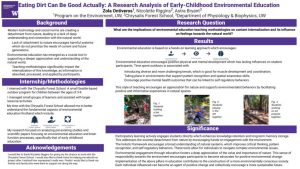Eating Dirt Can Be Good Actually: A Research Analysis of Early-Childhood Environmental Education
Modern cultural trends are encouraging society to feel detached from the natural world. Popular technology, in addition to social expectations, are minimizing time spent outside for the average person. This is especially prevalent in urban centers and marginalized communities. Access to nature is becoming more of a luxury experience for many. This perceived detachment encourages harmful systems, such as resource exploitation and climate change, which are unsustainable when considering the projected needs of future populations. The purpose of my research is to address these issues by analyzing the positive effects of facilitated time in nature. During my time with the Chrysalis Forest school I was able to build upon this research to better understand its implications for future generations by directly working with youth participants. The methodologies used with this style of teaching center around active participation with the content being taught. Students engage multiple of their five senses, which in turn creates neural pathways that are associated with long-term memory. This not only supports knowledge retention but also allows participants to feel much more connected with the content being taught. These implications are substantial for both individual participants and society, because they support the spread of ecological knowledge. Additionally, time spent in nature is important for developing an appreciation for the natural world. Participants are more likely to internalize the taught content, and in turn make behavioral changes to protect the environment. By supporting environmental education, widespread isolation and inlying behaviors can reduced, and sustainable behaviors can be nurtured.
